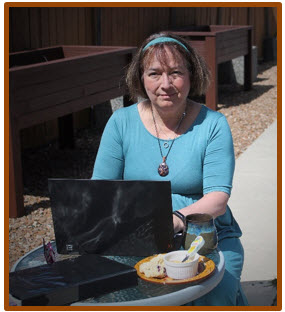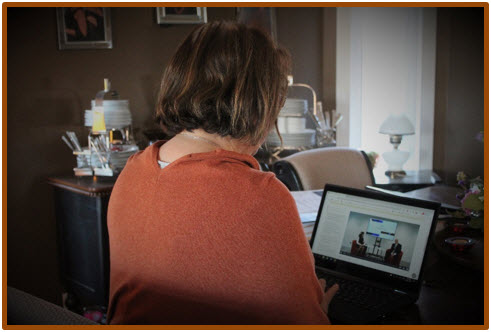Provincial Court Judge Stella Frame answers questions about her recent education leave.
You were on Education Leave for a few days during the reduction in court services caused by the pandemic. Tell us how that came to be?
Judges in the Provincial Court of BC are required to participate in two educational conferences per year of 2.5 days each in order to maintain our legal knowledge and ensure we are sensitive to the social and cultural contexts of our communities. These conferences are designed and presented by our own well-respected Education Committee. In addition, we may take five more days of judicial education at a conference of our choice. My optional education leave was scheduled to start on May 6. The conference I had selected was on the compelling theme of diversity, including Indigenous rights and the courts. My conference was cancelled due to the coronavirus and I was unable to postpone my education leave because the Court will need as many judges as possible to hear cases when pandemic restrictions ease.
So how did you spend your education leave?
There are a large number of webinars, podcasts, videos and study materials available to us. What we usually lack is the time to review and study it all! I broke up my days into broad themes covering topics such as high conflict parenting, self-represented litigants, virtual hearings, Indigenous reconciliation and the courts, sexual assault themes, internet luring, child witnesses, youth in crime, domestic violence, and mentally disordered accused persons. These are all important and timely topics that would ordinarily be components of any number of conferences I would have liked to take. I thought these sessions would all be valuable for reviewing existing law, reading emerging law, and learning what is happening in other jurisdictions.
How did it work for you?
My observation about this method of study is that it is fortunate we have the alternative in this unusual time, but nothing compares to in-person education! There are always distractions but there are more when at home all day.
What are the keys to avoiding those distractions?

The keys to success in self-study are to schedule topics, have a comfortable study space, and prepare snacks and drinks in advance so there are fewer distractions. I made my Nana’s scones (“scones” pronounced her way, like “lawns”, not “cones”) and some lemon curd, poured a nice mug of coffee and a big glass of water.
When the weather permitted, I preferred to study outside until the sun rose high enough to make my computer screen too hard to see. Then I moved inside to more ergonomic but less interesting accommodations, where I also studied during the more inclement days.
Tell us what your day looked like
I am an early riser, so I start my daily routine with some exercise around 5:30 or 6:00 a.m. I need to have this mind clearing activity before sitting down in front of a computer for hours. This is followed by coffee, and then I sit down to serious business, with one or more programs each morning and afternoon. Every study session was interesting and intense, and I took time to consider how to apply what I was learning to my work. The materials were well done. If I had to study at home, I certainly had the material to make it interesting and enriching!
What did you study on your leave?
The schedule I prepared included webinars on High Conflict Parenting, The Offence of Internet Luring, and Virtual Hearings: Issues and Challenges, as well a series of videos on issues in sexual assault trials.
In addition, I prepared a list of benchbooks (online books written for judges) to review on topics including Self Represented Litigants, the Youth Criminal Justice Act, Mentally Disordered Accused Persons, as well as a Science Manual for Canadian Judges and a Guide to Reconciliation in Canadian Courts.
I thought I would round out this ambitious agenda with a podcast on Domestic Violence.
The webinars and benchbooks were produced by the National Justice Institute (NJI), an independent, judge-led organization providing educational programs and resources to Canadian judges.

Reading materials were perhaps the least satisfactory. There are no dynamic speakers, interesting slide presentations or thought-provoking questions to engage. However, most of the materials were well organized and well written, making it easier to study. We do so much reading already that it can be a challenge to add more! A particularly helpful presentation was the English script accompanying NJI’s French presentation of Virtual Hearings: Challenges and Issues. It is a complex challenge to take our courts into the virtual courtroom, but I feel we are in capable hands with our Chief Judge.
What was the highlight of your studies?,
The International Association of Women Judges hosted a podcast on Domestic Violence, to be released in different languages. It took place on Zoom permitting judges from around the globe to participate. Judges from other jurisdictions including the UK and Uganda presented statistics and challenges faced by their communities, and the ways in which the increased domestic violence was straining available resources already under constraints because of the COVID pandemic. The similarities between the challenges faced in those countries and those we face here are striking.
I felt that the video presentations were all very informative whether they were short information pieces or lengthier presentations, and whether video series or webinars.
High Conflict Parenting, in particular, was presented by a conflict resolution trainer, Michael Lomax. His format, with informative slides and dynamic presentation, was engaging. While we obviously have to develop our own skills for dealing with high conflict or personality-disordered people, Mr. Lomax offered helpful perspectives for honing those skills.
The best collection for me, though, was the Sexual Assault Trials Subject Collection produced for judges by the National Judicial Institute. It is a series of videos addressing the challenges of sexual assault trials, from debunking myths to analyzing credibility. A powerful series, indeed.
More information
For more information on judicial education in the BC Provincial Court see Judicial Education.

